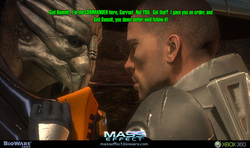Putting Holes in Stuff the JE Sawyer Way
Putting Holes in Stuff the JE Sawyer Way
Development Info - posted by Jason on Sun 2 May 2010, 23:31:27
Tags: Fallout: New Vegas; Josh SawyerObsidian's J.E. Sawyer let it be known that damage threshold is returning to the Fallout series with Fallout: New Vegas.
Imagine that there is an amount of damage that armor directly subtracts from damage... a "threshold" of damage, if you will. While a small percentage of damage may get through even the thickest armor, damage threshold can effectively neutralize a lot of small arms. Fallout 1 and 2 used numerical feedback to let the player know when their weapons weren't doing any damage. In F3 and F:NV, the player only sees enemy health meters that represent a percentage of total health rather than an exact value. This makes it difficult to tell how effective an enemy's armor is (as opposed to the target simply having a ton of health). In F:NV, the red shield appears next to a target's health meter when you hit it for damage that is equal to or less than the target's damage threshold. A HUD-colored shield appears next to the player's health meter when the player is hit for damage equal to or less than the player's damage threshold.
High RoF weapons typically have a low DAM, high DPS. E.g. 10mm SMG. Low RoF weapons are the opposite. E.g. Hunting Rifle. F:NV's Pip-Boy Weapons tab now cross-fades between DAM and DPS so the player can make more tactical choices about what weapon to use in any given circumstance. Having both of these values visible has also allowed us to revise the calculation of DAM/DPS values to be less abstract and more accurate. Using the weapons previously listed, a 10mm SMG would be best against unarmored/lightly armored targets at close range. The Hunting Rifle is ideal against armored targets at long range. But if the player wants to get fiddly with numbers, the Cowboy Repeater (mentioned in the Escapist preview) is better than either weapon against unarmored/lightly armored targets at long range since it is accurate, has a decent DAM and a better DPS than the Hunting Rifle. Add ammo subtypes and mods into the mix and there are a lot of ways to optimize the gear you carry and use.Thanks to Ausir for pointing this out
Imagine that there is an amount of damage that armor directly subtracts from damage... a "threshold" of damage, if you will. While a small percentage of damage may get through even the thickest armor, damage threshold can effectively neutralize a lot of small arms. Fallout 1 and 2 used numerical feedback to let the player know when their weapons weren't doing any damage. In F3 and F:NV, the player only sees enemy health meters that represent a percentage of total health rather than an exact value. This makes it difficult to tell how effective an enemy's armor is (as opposed to the target simply having a ton of health). In F:NV, the red shield appears next to a target's health meter when you hit it for damage that is equal to or less than the target's damage threshold. A HUD-colored shield appears next to the player's health meter when the player is hit for damage equal to or less than the player's damage threshold.
High RoF weapons typically have a low DAM, high DPS. E.g. 10mm SMG. Low RoF weapons are the opposite. E.g. Hunting Rifle. F:NV's Pip-Boy Weapons tab now cross-fades between DAM and DPS so the player can make more tactical choices about what weapon to use in any given circumstance. Having both of these values visible has also allowed us to revise the calculation of DAM/DPS values to be less abstract and more accurate. Using the weapons previously listed, a 10mm SMG would be best against unarmored/lightly armored targets at close range. The Hunting Rifle is ideal against armored targets at long range. But if the player wants to get fiddly with numbers, the Cowboy Repeater (mentioned in the Escapist preview) is better than either weapon against unarmored/lightly armored targets at long range since it is accurate, has a decent DAM and a better DPS than the Hunting Rifle. Add ammo subtypes and mods into the mix and there are a lot of ways to optimize the gear you carry and use.
There are 24 comments on Putting Holes in Stuff the JE Sawyer Way














